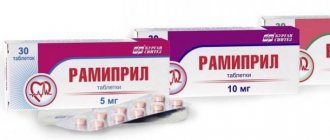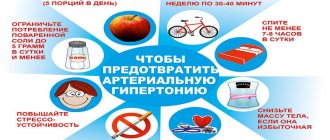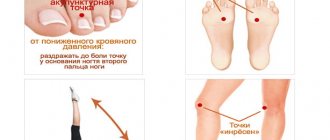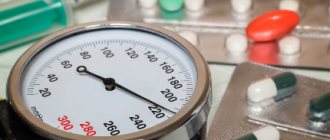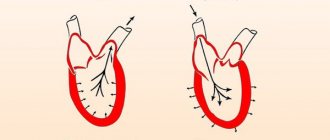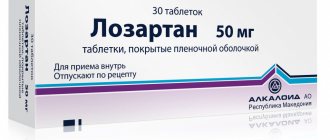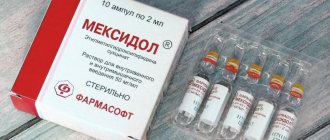Main classification of medications
We begin to talk about arterial hypertension when blood pressure measurement parameters over a certain period of time exceed values from 140 to 86 mmHg. If the value is 200 x 101 mmHg. Art. Exceeded, emergency assistance required.
Medicines in the form of injection solutions in ampoules should be used in emergency cases. It is not recommended to use them constantly. They very often cause side effects, and periodic use causes serious damage to the liver and kidneys.
A hypertensive crisis should not be allowed. To do this, you need to undergo an examination and identify the cause of the disease. Preventive treatment allows you to prolong the remission phase for a long time.
All types of injection drugs can be divided into three large groups.
- Peripheral vasodilators.
- ACE inhibitors.
- Diuretics.
Each group of drugs has its own characteristics and uses. Contraindications and possible side effects must be taken into account.
Peripheral vasodilators
The active ingredient of all drugs in this group is intended to relax the tone of vascular smooth muscles, expand their lumen and improve blood circulation. The need of the heart muscle for oxygen decreases. Effective and popular peripheral vasodilators are: Nitroglycerin, Molzidomine, Prazosin, Sodium Nitroprusside, Phentolamine.
“Sodium nitroprusside” reduces vascular tension and reduces the load on the heart. The antihypertensive effect develops in the first 2 minutes after intravenous administration of the drug.
ACE inhibitors
ACE inhibitors are used in the treatment of many diseases of the cardiovascular system. All drugs in this group block the enzyme that triggers the production of active angiotensin. This enzyme causes blood pressure to constantly rise.
ACE inhibitors include the following drugs: Captopril, Lisinopril, Ramipril, Spirapril, Fosinopril. Side effects are very rare. On a therapeutic basis, the patient may experience dizziness, nausea and vomiting, diarrhea, rapid heartbeat, and dry cough.
Absolute contraindications to the use of drugs are pathological processes in the kidneys, excess potassium in the body, pregnancy, and children under 5 years of age.
Diuretics
Diuretics remove excess fluid from the body by relaxing the heart muscle. They help relieve the symptoms that develop against the background of arterial hypertension.
Commonly prescribed medications include Hypothiazide, Indapamide, Clopamide, Amiloride, Furosemide.
Furosemide is used in the complex therapy of arterial hypertension. It removes sodium chloride from the body and relaxes the walls of blood vessels. After taking the drug, the volume of circulating blood decreases, swelling is relieved, headaches disappear and blood pressure decreases.
A contraindication to the use of diuretics is an increase in the level of uric acid and glucose in the blood, exacerbation of gout, arrhythmias, and seizures. Side effects can manifest themselves in the form of nausea and vomiting, defecation disorders, dry mouth, drowsiness, and decreased libido.
How to give injections for high blood pressure
Intramuscular injections are considered less effective for high blood pressure; it is better to inject the drug into a vein. Some drugs are painful and therefore require dilution with anesthetic solutions, such as Lidocaine, Novocaine. The ampoule with the solution is warmed in your hands and poured into a syringe.
If the drug is administered intravenously, several rules should be followed:
- A tourniquet is put on above the elbow and a fist is clenched;
- the injection site is disinfected;
- After puncturing the vein with a needle, the tourniquet is removed and the fist is released;
- A cotton pad is placed at the injection site, and then the needle is removed from the vein.
If the injection is given into a muscle, the following rules should be followed:
- the patient should lie on his stomach and relax his muscles;
- for injections, use a syringe with a long needle;
- the injection site is treated with an antiseptic;
- the injection is made in the upper right part of the buttock, inserting the needle at a right angle;
- After the injection, lie down for a while.
All high blood pressure medications should be administered slowly while monitoring the patient's condition. In case of shortness of breath, severe dizziness, increased sweating or feeling hot, the injection should be stopped.
Emergency injections
Consequences and irreversible changes in the body during crises can be eliminated by calling an ambulance in a timely manner. Doctors can give the right injection, reducing risks. Based on the condition, the doctor determines whether to use injections or tablets. As a rule, to quickly provide an effect, specialists use:
The combined mixture is called Troychatka. You need to draw several solutions into the syringe at once. Papaverine 2 ml (2%) helps normalize blood flow and pressure. Diphenhydramine 1 ml (1%) calms the nervous system. Analgin 2 ml (50%) anesthetizes and relieves inflammation. The injection is given intramuscularly and is used only for critical situations. This injection is contraindicated for long-term therapy.- Dibazol and Papaverine. The combination helps reduce high rates caused by spasms. For an injection, 4 and 2 ml are used, respectively. The injection must be done slowly, and the combination itself is not suitable for older people. The drugs are administered intramuscularly; they are not suitable for people with upper blood pressure below 90 units or for diabetics. If severe temporal pain occurs, you can add Analgin to the syringe.
- Hot prick. This remedy is used to relieve crises, injections can be with different components, the injection is painful, and is administered slowly. Before administration, the drug is warmed up in the hands.
If an ambulance is called, doctors relieve the crisis and reduce the patient’s blood pressure on the spot. In some cases, hypertensive patients will have to be hospitalized.
What injections are given for low blood pressure?
Only a specialist can decide what to do if your blood pressure is low. Most often, injections are used during therapy in a hospital setting or in emergency cases when calling an ambulance.
The following medications can be used to increase blood pressure.
- "Mesaton."
- “Pantocrine.
- "Dopamine."
- "Norepinephrine hydrotartrate."
- "Camphor".
- "Angiotensinamide.
- “Cordiamin.
- "Caffeine."
Medicines tone and constrict blood vessels, improve blood circulation, and activate the circulatory and central nervous systems. As a result, blood pressure levels are normalized.
What injections are prescribed for high blood pressure
Self-administration of high blood pressure injections is not recommended.
They are carried out by ambulance doctors, and if necessary, treatment continues in a hospital setting.
Patients may need medications that dilate or constrict blood vessels, remove excess fluid from the body, reduce heart rate, eliminate vasospasm, and restore breathing. The choice of medication for arterial elevation depends on the accompanying symptoms.
What injection is given when my blood pressure suddenly rises? Your doctor may prescribe injections of Triplet, Papaverine from Dibazol, Magnesia, Enap, Captopril, Sodium Nitroprusside.
Universal
A universal remedy that will help with high blood pressure is Troychatka. Its effect is short-lived, but its components will quickly cope with the attack.
The composition of the “tochka” includes the following ingredients:
- "Analgin" eliminates pain;
- "Diphenhydramine" calms the nervous system, reduces heart rate;
- "Papaverine" is intended to relax the walls of blood vessels, eliminate spasms, and improve blood supply to all internal organs.
This group of drugs also includes Sodium Nitroprusside, Hydralazine, Labetalol, Nicardipine, Enalaprilat, Azamethone Bromide.
Combined products
To effectively lower blood pressure, doctors sometimes mix several medications that have different effects on the body. A popular combination is “Dibazol” with “Papaverine” or “Analgin”. A proven measure is “three”. The blend consists of Diphenhydramine, Papaverine and Analgin.
The combination of these drugs helps to quickly weaken the attack and improve the patient’s well-being.
The contents of three ampoules are drawn into one syringe.
“Troichatka” has the following properties: relieves pain, relaxes the walls of blood vessels, increases the access of nutrients to tissues, and normalizes pulse and blood pressure.
Hot injections
Hot injections are prescribed for a sharp increase in blood pressure, when the condition is on the verge of a hypertensive crisis. The procedure involves slowly injecting calcium chloride or magnesium sulfate into the upper half of the gluteus maximus muscle using a thin needle.
Using heat therapy, you can quickly restore pressure parameters by dilating blood vessels and improving blood circulation, as well as relieving the tingling sensation. The procedure must be carried out with a special thin long needle. Before injection, the ampoule with the solution is heated.
Emergency injections
With high blood pressure, the patient becomes worse, waiting for the pills to work is dangerous, so they give injections.
Emergency lowering of blood pressure can be achieved using a list of drugs:
- Dibazol 1% solution.
- Papaverine can be served.
- A shot of magnesium may help lower blood pressure.
- You can inject Lasix 1%.
- The blood pressure-lowering drug “Analgin” 50%, “Diphenhydramine” 1% and “Papaverine” 2% helps.
These drugs help eliminate a hypertensive crisis at home. The decision to prescribe them is made when nausea and vomiting, dizziness, poor coordination of movements, severe headaches occur against the background of increased blood pressure.
A solution of magnesium sulfate removes excess fluid from the body, calms the nervous system, relieves spasms, dilates blood vessels and improves blood flow.
The solution is best administered gradually by drip in a hospital setting. Ambulance specialists insidiously inject the drug into a vein.
Injections for hospital treatment
When pressure increases, the blood supply to internal organs is disrupted. The result is hypoxia and nutrient deficiency. All structures of the brain and heart especially suffer from this. In this case, injections are given to reduce blood pressure; it is better to complete the course of therapy in a hospital setting.
If the patient is treated in a hospital, doctors prescribe the following drug therapy:
- "Sodium nitroprusside";
- “Relenium;
- “Eufillin;
- “Clonidine;
- “Lasix;
- “Captopril.
"Clonidine" is administered intravenously. The drug calms the nervous system and lowers blood pressure. Your blood pressure may rise for a few minutes immediately after taking the medicine, but then it will slowly begin to fall back to normal levels.
In the absence of appropriate treatment, there is a high probability of developing a hypertensive crisis with life-threatening consequences. Also, for arterial hypertension, drugs from the group of alpha-adrenergic blockers (Nitsergoline, Proroksan, Kornam, Tonocardin) are considered effective, since they turn off the action of beta and alpha adrenergic receptors. As a result, blood pressure is reduced to normal values and serious complications are prevented.
Prevention of blood pressure disorders
Most of the older population suffers from hypertension. To exclude the development of this disease, not only treatment, but also preventive measures are carried out.
To avoid having to use injections or take pills, you need to:
- Quit smoking, drinking alcohol and using drugs.
- Eat right, eliminate or reduce salt intake, reduce the amount of fats and carbohydrates in your diet.
- Play sports, pay attention to walking in the fresh air, swimming, running.
- Normalize your work and rest schedule.
- Reduce the number of stressful situations.
Preventive measures include timely treatment of diseases that provoke high blood pressure.
You should not engage in self-therapy; It must be remembered that the administration of hot injections and other injections requires a doctor’s permission.
In order not to miss the development of hypertension, constant monitoring of pressure is necessary. Blood pressure measurements should not be taken immediately after eating, waking up or physical activity.
It is best to do this after 10-20 minutes. To obtain reliable information, you must adhere to the rules. If systematic deviations in the readings are detected, additional consultation with a cardiologist will be required.
- How to lower intracranial pressure at home
What can you inject at home?
To lower blood pressure at home, drugs are prescribed in the form of tablets. If the pill you take does not help, you need to call an ambulance. Upon arrival, the doctor may administer Papaverine, Dibazol or Troychatka intramuscularly.
Other medications may also be prescribed:
- "Enaprilat";
- “Clonidine;
- “Furosemide;
- "Magnesia".
Once you feel better, contact your physician as soon as possible to adjust further treatment. Additional research may be required.
Groups of injectable drugs for hypertension
For hypertension, drugs of the following pharmacological groups are often prescribed:
- ACE inhibitors (Ramipril, Quinapril, Fosinopril) help cope with high blood pressure and heart failure. After taking medications, the blood vessels dilate and the load on the heart decreases.
- Calcium channel blockers (Nifedipine solution, Amlodipine, Cilacar) help eliminate a hypertensive crisis.
- Beta blockers (Sotalol, Metoprolol, Labetalol) block receptors that increase blood pressure. As a result, your well-being improves and your heart rhythm is restored.
- Diuretics (Lasix, Furosemide).
- PDE inhibitors include the Eufillin solution, which can be administered during an attack of hypertension. The drug stimulates cardiac activity, reduces vascular tension and improves blood flow.
Each drug is administered slowly, strictly observing the dosage. If alarming reactions occur, the drug is discontinued.
conclusions
Emergency medical care is not a method of treatment or diagnosis. Its role is to quickly and safely remove a person from a condition that threatens health and life. If a hypertensive crisis occurs for the first time, even against the background of previous hypertension, see your family doctor, therapist or cardiologist as soon as possible.
Each crisis strikes the heart, blood vessels, and brain, aggravating the course of the underlying disease. It is important to remember the secondary prevention of such attacks, which consists of regular monitoring of blood pressure, taking prescribed medications without interruption or self-cessation, as well as maintaining a healthy lifestyle.
What is the advantage of injections over tablets?
Tablets are prescribed by qualified specialists at the initial stage of development of arterial hypertension. Effective injections are necessary when it is necessary to provide rapid relief to the patient or in the presence of complex hypertension.
In life-threatening situations (myocardial infarction, aortic rupture, pulmonary edema), the drug is administered intravenously in small portions with a catheter.
The injections cause a sharp increase in blood pressure, which is dangerous for the body. Therefore, they should only be given by a doctor. The tablets act gradually and slowly.
The advantage of high blood pressure shots over pills includes that the drug is absorbed into the bloodstream and begins to work faster because it does not travel through the entire gastrointestinal tract. In addition to the fact that the result will be achieved in a short time, the risk of side effects is reduced.
The most common adverse reactions are increased dizziness and nausea. Medicines belonging to the ACE inhibitor group can often cause coughing.
Modern methods of quickly reducing blood pressure in emergencies
Current medicine does not recognize other ways to quickly normalize blood pressure, except for the use of specific antihypertensive drugs. They have been developed for each cause of high blood pressure. Medicines are easy to dose and control. The effects are well studied, tested and predictable.
Unconventional methods are potentially dangerous to health and life, since they delay the patient’s seeking medical help, diagnosis and appropriate treatment. Negative consequences of using alternative drugs include heart attack and stroke.
Who are contraindicated for injections?
Most shots on high blood pressure should not be taken in hypotension, severe heart failure, liver and kidney failure, syndrome, syndrome, brain injury, hypotension.
Many medications are prohibited during pregnancy and breastfeeding.
Without favorable reactions of all medications used to lower blood pressure, there may be: weakness, dizziness attacks, speech disorders, drowsiness, redness of the face and feelings of hotness in the body, breaking the stool, abdominal pain, shortness of breath, allergic rash Failure
Complications that may develop from injecting medications for high blood pressure can be in the form of kidney and liver disease. In case of incorrect administration of the drug, a rapid drop in pressure, collapse and shock. If the procedure is not performed correctly, there may be an infection.
Stages of emergency care
The appearance of pronounced clinical signs of hypertension requires the implementation of a certain algorithm of actions:
- Calm the patient - self-hypnosis does not always help a patient with increasing panic. Doctors recommend using tincture of motherwort, hawthorn or valerian root as acceptable medications. For pain in the heart, use Corvalol or Validol, Nitroglycerin. Nervous excitement intensifies the attack; the sick person must calm down.
- Give a comfortable position - regardless of the type, the patient’s head is located above the lower extremities (to speed up the outflow of blood from the brain to the legs). He can lie down, sit - the forced position is determined by his location (house, street).
- Warm up - an attack can cause chills, trembling and a decrease in temperature of the upper and lower extremities. The patient is covered with a blanket and his legs are wrapped. For quick warming, use a heating pad or a hot foot bath. You can pour mustard into your socks or place mustard plasters on the shin area. Heat is a distracting procedure and helps redirect blood flow from central vessels to peripheral ones. Alleviation of the general condition and relief of headaches is carried out by installing mustard plaster on the occipital region.
- Ensure the supply of fresh air - open the windows or expose them for ventilation. You can cool the room using an air conditioner.
- Remove restrictive clothing - unfasten buttons, belt, collar. Remove the tie, sweater and anything that compresses the chest and prevents the victim from breathing.
Medicines are given only to patients who have used them before. It is not recommended to conduct experiments on a person with an attack of hypertension - the body’s reaction to an unknown medication can be anything. In case of primary increased blood pressure, wait for the arrival of the ambulance team, who themselves will select adequate therapy.
